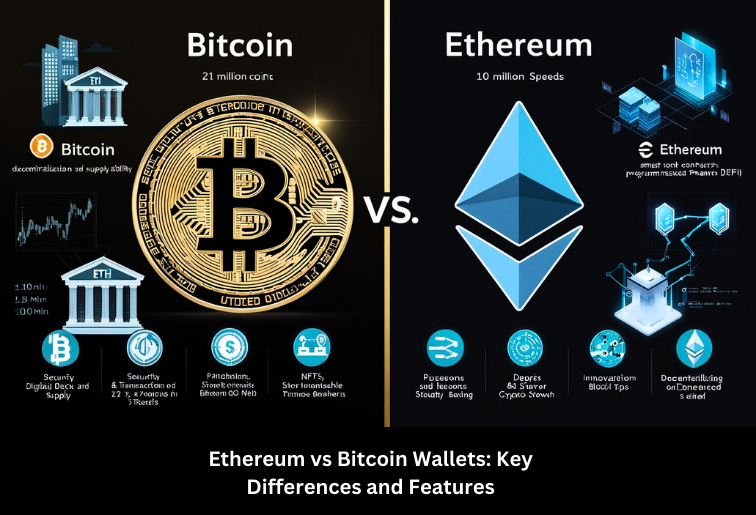Cryptocurrency wallets play a crucial role in securing digital assets, and choosing between an Ethereum and Bitcoin wallet can be challenging. Both serve distinct purposes, catering to different blockchain ecosystems and functionalities. Understanding their key differences will help you select the right wallet for your needs.
Understanding Ethereum and Bitcoin Wallets
A Bitcoin wallet is designed specifically to store, send, and receive BTC. It follows the Bitcoin blockchain’s structure and security protocols. On the other hand, an Ethereum wallet supports ETH and other ERC-20 tokens while providing smart contract functionality.
Key Differences Between Ethereum and Bitcoin Wallets
1. Blockchain Compatibility
Bitcoin wallets work exclusively with the Bitcoin blockchain, limiting their use to BTC transactions. Ethereum wallets, however, support multiple assets, including ERC-20 and ERC-721 tokens, enabling interactions with decentralized applications (dApps).
2. Security and Private Keys
Both wallet types prioritize security with encryption and private key protection. However, Ethereum wallets often include additional layers of security to facilitate DeFi interactions and smart contract transactions.
3. Transaction Speed and Fees
Bitcoin transactions require confirmations from miners, making processing times longer, especially during network congestion. Ethereum offers faster transaction processing, but gas fees can fluctuate based on network demand.
4. Smart Contract Functionality
A significant advantage of an Ethereum wallet is its ability to execute smart contracts. This feature is absent in Bitcoin wallets, as Bitcoin’s blockchain is primarily designed for peer-to-peer transactions rather than programmable functionalities.
5. Wallet Types and Usability
Both Ethereum and Bitcoin wallets come in various forms, including hardware, software, mobile, and web wallets. However, Ethereum wallets often integrate with DeFi platforms and NFT marketplaces, whereas Bitcoin wallets focus mainly on secure BTC storage and transactions.
Choosing the Right Wallet for Your Needs
If your primary goal is secure Bitcoin storage and transactions, a Bitcoin-specific wallet may be the best option. However, if you engage in DeFi, NFTs, or need support for multiple assets, an Ethereum wallet provides greater versatility.
Conclusion
Both Ethereum and Bitcoin wallets offer unique benefits depending on your crypto activities. Understanding their differences in compatibility, security, transaction fees, and smart contract functionality will help you make an informed decision. Whether you’re a long-term Bitcoin holder or an Ethereum ecosystem participant, choosing the right wallet ensures better security and usability for your digital assets.
Stay updated on the latest in blockchain technology by visiting Blockchain77.

